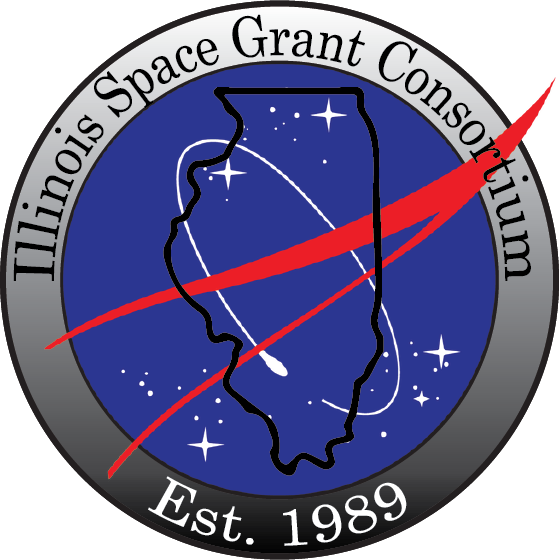Our History
Our consortium is part of the National Space Grant College and Fellowship Program (link is external) which was established by Congress in 1989. Space Grant contributes to the nation’s science enterprise by implementing research, education, and public service projects through a national network of university-based Space Grant consortia. Space Grant consortia have been established in all 50 states, the District of Columbia, and the Commonwealth of Puerto Rico. Nationally, the Space Grant network has 850 affiliate members from academia, industry, government agencies, the military, and nonprofit institutions. Thirteen of these are members of the Illinois Space Grant Consortium.
Consortium Profile
Expanding and retaining Illinois’ future Science, Technology, Engineering, and Math (STEM) workforce is a high priority for the Illinois Space Grant Consortium (ISGC). ISGC’s mission is to coordinate opportunities in the STEM disciplines in pursuits aligned with the National Space Grant Program’s objectives and NASA’s Mission Directorates; by inspiring, engaging, educating, and employing the diversity of Illinois’ students, faculty, and the public through stimulating research, education, and outreach programs.
ISGC makes strategic investments aligned with NASA’s mission and targeted toward the public, PreK-12 education, higher education, and research infrastructure, which provides opportunities that advance aerospace knowledge, research, and technology throughout the state. Our network of affiliates includes 11 academic institutions and 2 informal education institutions that provide NASA-unique opportunities coordinated with the NASA Mission Directorates and the needs of Illinois and its citizens. Our strongest alignment is with the Space Technology Mission Directorate to develop transformative space technologies to enable future missions. Our long manufacturing, research, and engineering history in Illinois allows ISGC to support all four Mission Directorates in a significant way. Illinois Space Grant Consortium funding of competitive research projects and direct student opportunities allows us to be responsive to NASA’s mission priorities each year. Each competitive proposal funded by ISGC emphasizes the support of NASA’s Mission Directorates as well as a commitment to meeting Illinois’ specific needs. Our award of the Artemis Student Challenge Theme 1: Teaching and Resource Availability will allow us to expand NASA technology education by inspiring the next generation to engage in the exploration of the Moon, Mars, and beyond. These opportunities provide an integrated, diverse, and comprehensive Space Grant program for Illinois.
Diversity and Inclusion
The Illinois Space Grant Consortium supports and upholds the NASA Diversity and Inclusion Policy Statement. “The National Aeronautics and Space Administration (NASA) is committed to a culture of diversity and inclusion, where all employees feel welcome, respected, connected, and engaged. As the world’s leader in aeronautics, space exploration, science, and technology, we embrace the critical importance of cultivating and empowering a diverse and inclusive workforce and work environment-enabling NASA to attract the widest and deepest pools of talent, leverage the capabilities of our exceptional workforce; and empower all personnel to be authentic, to participate, and to fully contribute. We understand this provides NASA access to the highest levels of knowledge, capabilities, creativity, problem solving, decision making, and performance. And this will enable NASA to achieve the greatest mission success.”
ISGC works to provide an inclusive and interdisciplinary cohort of students, mentors, affiliates, and more and aligns those efforts with the Executive Order On Advancing Racial Equity and Support for Underserved Communities Through the Federal Government (link is external).
National Space Grant Alliance
The National Space Grant Alliance Inc. (NSGA) is a nonprofit, incorporated 501(c)(4) organization whose objects and purposes are to promote the social welfare by engaging in such activities, as are permitted hereunder and under all applicable laws, to expand and enhance the capacity of the United States of America to carry out education, research, and public outreach activities in science, mathematics, engineering, and technology (SMET) and additional fields, related to space, aeronautics and Earth system science.
Organization
Logo Repository
Acknowledgment Statement
Strategic Plan
Education
To enhance teaching and research participation to attract undergraduates to modern science and engineering.
- Provide undergraduate training through fellowship and scholarship awards, emphasizing awards with a student research component.
- Develop interdisciplinary courses, including introductory courses designed for undergraduate students not majoring in scientific or technological disciplines.
- Develop advanced design and systems courses to provide linkage with the graduate program.
- Develop community college initiatives to promote continued progress in education.
- Focus on involving underrepresented groups, women, and persons with disabilities.
- Help attract resources that will provide high-quality classroom and laboratory facilities.
Research
To provide strong academic training through research experiences focused on aerospace science and engineering.
- Provide graduate student support in critical targeted areas through fellowships.
- Capture new faculty participation in research with NASA centers.
- Initiate inter-consortium disciplinary projects.
- Implement research activities linked to industry.
- Focus on involving underrepresented groups, women, and persons with disabilities.
- Collaborate with industry.
Outreach
To enhance pre-college students’ and the general public’s science, technology, engineering, and mathematics (STEM) skills and knowledge.
- Establish a pipeline to education institutions of Illinois.
- Enhance precollege teacher education programs with an emphasis on STEM fields.
- Provide information and activities to increase public appreciation for the direct and indirect benefits of NASA-sponsored research.
- Focus on involving underrepresented groups, women, and persons with disabilities.
